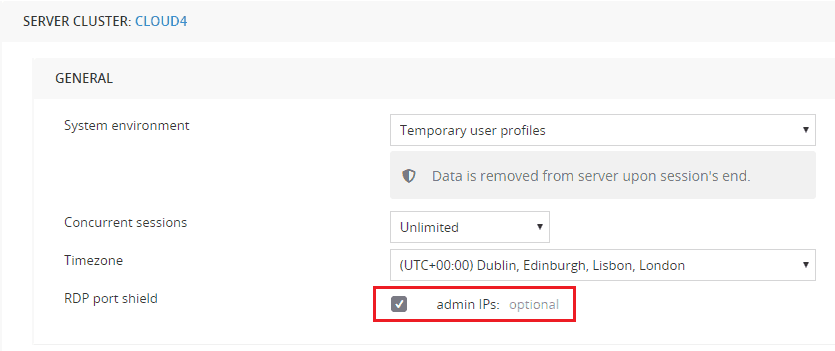Port Shield
Dynamic, proactive protection against RDP and HTTP vulnerabilities, including brute force attacks and ransomware.
2020 has seen a dramatic increase in ransomware and brute-force attacks, with Kaspersky labs reporting a 10X increase in the first two quarters. That access is increasingly being gained via brute-force attacks to open and exposed remote access points such as RDP and HTTP. Cameyo’s own research into brute force attacks revealed that the average internet-connected server currently faces 150K brute force-triggered password attempts per week.
VPNs were never designed with the intent of enabling widespread remote work, especially when many of those remote workers are utilizing non-IT-managed devices on home networks. In today’s world of mass remote work, VPNs are effectively providing a secure tunnel for your people’s personal and potentially-infected devices to connect directly to your corporate network. Cameyo’s platform, with its enhanced Port Shield capabilities and its NoVPN technology, enables organizations to alleviate the pressure currently being put on VPNs by offloading the tasks that VPNs were not designed for in the first place.
Dynamic Protection
To protect customers from these HTTP and RDP-based vulnerabilities, Cameyo’s Port Shield is the first built-in security technology of its kind that automatically closes RDP and HTTP ports to the entire world, and then dynamically opens and closes them specifically to authenticated users, based on white-listed IP addresses, only when needed.


Industry-First Innovation
Cameyo Port Shield is the first security solution capable of automatically and dynamically opening and closing HTTP and RDP ports on-the-fly at the Windows Firewall level rather than statically. Unlike other solutions that keep HTTP and RDP ports open only to a number of pre-defined number of IPs thereby limiting cloud and geographic flexibility, Cameyo proactively closes the ports at the Windows Firewall and only opens it if/when needed based on a validated user’s IP, authenticated through Cameyo’s central portal.
Extending Our Commitment to Security
Port Shield extends Cameyo’s long-standing commitment to industry-leading security, including protecting customers by delivering applications over HTTPS, separating an organization’s applications from the OS to protect against corrupted machines, the use of multi-factor authentication that utilizes dynamic 110-character passwords, and a host of data and privacy protections including session & user isolation and the automatic wiping of data from Cameyo servers as each session ends.

“As organizations shift to a model where they must enable remote work on a permanent or hybrid basis for much of their workforce, their attack surface can grow significantly due to RDP and HTTP vulnerabilities. Cameyo’s Port Shield technology provides an additional layer of security, baked in at the core of the platform, enabling organizations to provide safe & secure access to business-critical applications on any device, without the need for third-party security solutions.”
How much does Port Shield cost?
Cameyo Port Shield is a new security technology baked into the Cameyo virtual application delivery platform, providing every Cameyo customer with automated, dynamic protection against HTTP and RDP brute force attacks and ransomware. These new capabilities are now live in the platform for all customers, with no added cost to the customer.
How is Port Shield different?
To date, Cameyo Port Shield is the first security solution capable of automatically and dynamically opening and closing HTTP and RDP ports on-the-fly at the Windows Firewall level rather than statically. Unlike other solutions that keep ports open only to a number of pre-defined number of IPs thereby limiting cloud and geographic flexibility, Cameyo proactively closes the ports at the Windows Firewall and only opens it if/when needed based on a validated user’s IP, authenticated through Cameyo’s central portal.
How does Port Shield work?
Port Shield works by managing the Windows Firewall and keeping a server’s RDP and HTTP/S ports closed at all times, then dynamically opening them only for certain authenticated users, only as needed. Cameyo customers are not required to take any action in order to utilize Port Shield – it is now active for all users of the Cameyo platform, and is included at no additional cost.
How does this compare to VPNs?
In the early days of the pandemic, many organizations defaulted to relying on VPNs for enabling remote work. VPNs work well when organizations have a certain percentage of their people who need to work remotely, when those people are utilizing IT-managed devices, and when there are firmly-enforced rules regarding USB keys and the use of work apps only. But VPNs were never designed with the intent of enabling widespread remote work, especially when many of those remote workers are utilizing non-IT-managed devices on home networks. In today’s world of mass remote work, VPNs are effectively providing a secure tunnel for your people’s personal and potentially-infected devices to connect directly to your corporate network.
Cameyo’s platform, with its enhanced Port Shield capabilities and its NoVPN technology, enables organizations to alleviate the pressure currently being put on VPNs by offloading the tasks that VPNs were not designed for in the first place. Cameyo lets IT deliver all of the business-critical apps their people need, on any device, without those apps needing to be installed on that device, and without that device having to connect to the corporate network. Organizations get simpler, more secure access to their apps on any device, and IT gets to relieve the pressure put on VPNs while reducing cost.
Get $500 in Credits Now
Sign up for Google Cloud Platform. Run Cameyo in your GCP account. Get $500 in GCP credits.
